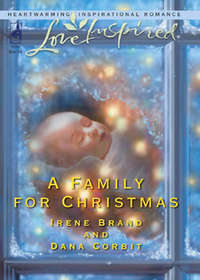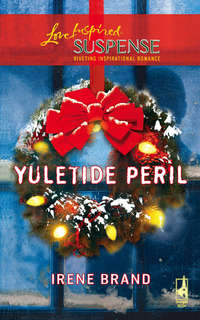
Полная версия
The Christmas Children
Embarrassed that she’d allowed a phobia from the past to make her reject Paul’s overture of friendship, Carissa lifted a flushed face to him. Her blue eyes mirrored her anxiety. Her voice was strained when she said, “I’m glad, too, that I didn’t injure you,” and she added in her thoughts, for several reasons.
Paul wondered at the anxiety revealed in Carissa’s eyes. She was a successful businesswoman…but had he detected a flaw underneath the facade that she presented to the world? At this moment, she seemed like a bewildered little girl unable to understand what had happened to her. For several years, Paul had made it a point to tend to his own business and keep aloof from the problems of others. Now, for some inexplicable reason, he longed to remove that confused, lonely expression from her face. Before the next few weeks passed, he would no doubt learn if it was in his power to do so.
As Paul moved his belongings into the apartment, he kept thinking of Carissa. When Jennifer had jilted him, he’d made up his mind he was through with women. He’d deliberately chosen a job that would keep him out of the United States. He hadn’t been tempted to seek the companionship of women in the countries where he’d worked, and, most of the time, he was content with his bachelorhood.
Occasionally, Paul wondered if he was missing anything by not having a family. If he didn’t have any children, who would carry on the Spencer name and family traditions? He often questioned what would become of the money he’d accumulated, if anything happened to him—for his sister didn’t have any children, either. And what could Naomi do with the fortune she’d inherited from her husband? It was only in the past year, since his fortieth birthday, that Paul had become concerned about this issue.
Carissa was an attractive woman, and he smiled when he thought of her embarrassment over hitting him on the head. But, personally, he thought it took a lot of courage to attack a man with no better weapon than a poker. Paul admired courage in anyone.
She was a little woman—her head didn’t even reach his shoulders—but at times she displayed a dignity that belied her short stature. And Paul had detected a lot of warmth and vitality waiting for release beneath that dignity.
He sensed that Carissa didn’t think she was beautiful, but beauty was in the eye of the beholder. After the way Jennifer, who was tall and shapely with black hair and vivid green eyes, had treated him, Paul had decided that he’d never choose another companion based on outward appearance.
From what he’d seen of Carissa, he believed her beauty was more than skin deep.
Paul saw his sister so rarely that he was disappointed to learn that Naomi had gone to Florida. He’d called from Kennedy Airport to have his home phone connected, so he asked Carissa for the telephone number of her condo so he could call his sister. He tried three times before he finally found her at home. She couldn’t believe he was actually in New York.
“Why didn’t you tell me you were coming home?” Naomi cried in dismay. “I would have stayed in New York. But you can come here,” she added. “The weather is wonderful. I go to the beach every day for several hours, and I’m feeling better already. I’ve even decreased my pain medicine.”
“I’m glad to hear that, sis. I’ll come down for a few days before I go back to my job.” The logical thing for him to do was to go to Tampa immediately, but as strange as it might seem to him, he wanted to see more of Carissa.
“I’d come home,” Naomi continued, “but I can’t because I’ve loaned the house to Carissa for two months. Have you met her?”
“Well, yes, we had an…unusual meeting.”
He explained how they’d met, and Naomi laughed merrily before she said, “I can’t imagine what happened to the door. I’m sure it was locked when I left home. Will you have it fixed?”
“Yes, I intend to.”
“How do you like Carissa?”
“She’s okay,” Paul said nonchalantly. Naomi’s ultimate goal was to see her brother married and settled down in the United States. He didn’t want his sister to read anything into his meeting with Carissa. “She was embarrassed at first about hitting me, but we laugh about it now.”
“Carissa is a very successful businesswoman. She sold her company for a bundle a few months ago. I’ve been told that the sale netted over a million dollars. And you should see this luxurious apartment!”
Paul thought he’d accumulated quite a lot of money, but he certainly wasn’t in Carissa’s league. His attraction to Carissa had reached its first barrier. He wouldn’t fix his interest on a woman who was worth more financially than he was. But in spite of his reservations, after he’d finished his dinner, Paul kept searching for an excuse to see Carissa again that evening.
As she often did at home, Carissa prepared a taco salad, sat in front of the television and watched the evening news while she ate. Before she’d sold her company, her days had been so busy with business matters that she didn’t have much of a social life. It was usually a relief to escape into her apartment at night and let the walls close around her. Her only relaxation was at the health club in the basement of the condo complex. She’d made some good friends there, and she missed them tonight.
She’d gotten a sack of Red Delicious apples at the grocery store, and while she munched on one for dessert, she reflected on her day with Paul. This time yesterday she’d never heard of the man, but they’d gotten acquainted in a hurry. Had the time come for her to seek the male companionship she’d previously avoided? Now that she’d reached the mellow years, the hang-ups she’d had about dating shouldn’t be a problem. It was rather astonishing that she was even thinking about the subject, and most surprising was that she hadn’t had such thoughts until she met Paul Spencer.
“Hey, neighbor!”
The loud voice startled Carissa so much that she dropped the apple core on the floor. It took a moment for her to realize that Paul was calling on the intercom.
“Hey, neighbor!” The call came again before she remembered where the speaker was.
Smiling, she picked up the apple core, hurried into the kitchen and answered Paul.
“Hey, yourself.”
“I wanted to see if this thing still works. What are you doing?”
“Finishing dinner.”
“I promised to tell you why Yuletide is no longer a Christmas town. If you have time, I’ll come over and fill you in.”
“Great! I’d like some company.”
Humming a Christmas song that she’d just heard on the television, Carissa rinsed the dishes she’d used for supper and put them in the dishwasher. She prepared a bowl of grapes, cheese cubes and crackers and placed the food on a table between two large lounge chairs in the living room. She poured a jar of fruit punch over ice and was placing it on the table when Paul knocked on the back door. She motioned him inside.
“Brr!” he said, taking off his coat and laying it on the back of the couch. “The temperature is dropping quickly. If it wasn’t already, the lake should be frozen enough that I can go ice fishing tomorrow. If I make a nice catch, I’ll invite you to have dinner with me in my apartment.”
“Can you cook?” Carissa asked as she motioned him to one of the chairs. It seemed rather odd to be acting as hostess to Paul in his sister’s house.
“I’m a fair cook,” he said. “I’ve prepared dinners many times for some of my co-workers. But I’m not such a good fisherman, though, so don’t whet your appetite for a fish fry until you see the fish.”
“Help yourself to the snacks,” Carissa invited. “I’ll take you up on the invitation. I’m not a good cook— I just make what satisfies my appetite, and that’s not always what others like to eat. I never cook a meal for anyone. If I have guests, I take them to a restaurant for dinner.”
“Since I kept you up most of last night, I hesitated to barge in on you—you’d probably like to go to bed early. I’m sleepy, too, but I want to adjust to Eastern Standard Time, so I’m forcing myself to stay up.”
“Good idea. I haven’t done much overseas travel, but it usually takes a week for me to get over jet lag.”
Paul poured a glass of fruit juice and sipped it as he talked. “As I told you earlier, when I was a kid, Yuletide was just like a fairyland during the Christmas season. But a tragedy one Christmas Eve changed all of that.”
He paused, stretched out his long legs and continued. “That night, a woman and her baby came to town asking for shelter. She went to several businesses and private homes, as well as the police station, but everybody was too busy to help. The people didn’t mean to be callous, but they just expected the next person to take care of her. No one did, and on Christmas morning the woman and child were found dead, huddled in the entrance to Bethel Church.”
“Oh, how terrible!” Carissa said feelingly, and memories of her own neglected childhood surfaced.
“The woman had fled from an abusive husband, and she died from complications of an unattended childbirth. The temperature went to zero that night and the baby died from exposure.”
What a tragedy! Carissa could understand the reason the citizens of Yuletide hesitated to celebrate Christmas.
“The strange part of it was that the church was presenting a program that night based on an old legend of how Jesus had appeared disguised in a town one Christmas Eve. Disguised as a child, a poor woman and a beggar, He went from person to person asking for help, but everyone was busy preparing to celebrate the coming of the Christ Child, and they turned these people away.”
“I’m familiar with the story. The townspeople eventually learned that if they’d helped those who came to them, they would have received Jesus, too. So the citizens of Yuletide felt that in refusing to help the mother and child, it was as if they’d refused, like those people or the biblical innkeeper, to shelter the baby Jesus?”
Paul nodded and lifted a hand to rub his forehead. Although he hid his discomfort well, obviously he was in pain.
“No one could generate any enthusiasm for a big celebration after that. Although I consider it superstition, the general feeling seems to be that when God has forgiven the people of Yuletide for neglecting those two people, He’ll give them an opportunity to redeem themselves.”
“Wouldn’t it be wonderful if this is the year?” Carissa said. “I came to Yuletide looking for the Christmas spirit I had as a child.”
“What made you start looking at this time?”
“I sold my clothing design business a few months ago, and when I was cleaning out the office and storage room, I found a trunk that my grandmother had left to me. My uncle had shipped it to me after her death. There wasn’t anything valuable in it—mostly memorabilia that I’d kept since my school years. I trashed most of the things, but I kept this—”
She picked up the white key, and Paul thought Carissa had forgotten his presence as her mind took her quickly down memory lane.
“When I was about six, I participated in a program at our church, and I carried this Key to Christmas. I went from place to place trying to fit the key into a lock, and when I finally found a door the key would open, a nativity scene was revealed. When I came across this key a month ago, I realized how far I’d strayed from the teachings I’d learned as a child. I knew then that I had to find a wintery place to relive the Christmases of my childhood. I didn’t want to return to Minnesota because it doesn’t hold pleasant memories for me. Besides, all of my close relatives have died. It seemed like a coincidence that Naomi wanted to change locations at the same time I did.”
“As far as that’s concerned, I need to be reminded of what Christmas really means, too. Carissa, I hope you can revive the meaning of Christmas that you once knew. Maybe we can find it together.”
Their eyes met and held for a minute before Carissa looked away, too confused to even answer. She swirled the liquid in her glass, thinking that she was acting like a child.
“I guess it’s time for me to go,” Paul said. “I’m getting sleepy now. And you must be tired, too, unless you slept while I was napping earlier.”
She shook her head. “No, I didn’t sleep. I unloaded the car and settled in. Thanks for coming over tonight.”
She held out her hand to him, and, unsuccessfully stifling his amazement, he tenderly clasped her hand in his.
Without meeting his gaze, she said, “Your gesture in the doctor’s office took me by surprise, or I wouldn’t have reacted so foolishly.”
“It was just a friendly gesture,” he assured her.
“I know. A foolish quirk of mine caused my reaction. I’ll tell you about it someday. And I hope we can become friends.” With a warm grin, she added, “It’s always a good idea to make friends with your next-door neighbor.”
Carissa fell asleep easily, not even worrying about the unlocked back door; she felt protected with Paul nearby. But she woke up suddenly, about the same time she’d awakened when Paul had entered the house the night before.
She’d heard something. Carissa sat up in bed to listen. The sound seemed to come from the kitchen, and she eased out of bed, wishing she’d kept the poker upstairs. Vowing that she would secure the back door before another night, Carissa ran quickly and silently downstairs.
When she reached the last step, she said, “Who’s there?”
She heard a gasp and a scurry of feet.
Too frightened to be careful, Carissa snapped on the lights and rushed into the kitchen, just in time to see the pantry door close. She pushed a table in front of that door.
Standing beside the intercom, she shouted, “Paul! Paul! I need help.”
Although it seemed like hours, it probably wasn’t more than a minute before she heard Paul’s muffled tone. Poor man! She thought, somewhat humorously, that she’d ruined another night’s rest for him.
“What’s wrong?”
“Somebody is in the house. Come help me.”
“I’ll come right away. Be careful!”
She took a knife from a cabinet drawer for protection if the intruder should break out of the pantry.
Paul rushed in the door, dressed only in pajamas and slippers, rumpled hair hanging over his agitated brown eyes.
“In the pantry,” Carissa stammered.
Without asking questions, Paul motioned. “Get behind me.”
He pushed the table away and swung open the door, his body hunched forward, ready to attack if necessary.
“Come out!” Paul commanded.
Nothing could be heard for moments except Paul’s heavy breathing. Then there was a scuffling of feet, and Carissa stared, slack-jawed, disbelief in her eyes. Beyond words, she lowered the knife.
A teenage boy sauntered out of the pantry, followed by a little girl who held one of the red apples that Carissa had stored in the pantry. Another girl, probably eight or ten years old, peered around them, holding in her arms the teddy bear that Carissa had seen beside the fireplace the night she’d arrived.
The knife slipped from Carissa’s hand and clattered to the floor. She pulled out a chair from the table and slowly lowered herself into it to support her shaking legs.
“Any more where you came from?” Paul asked, peering into the pantry.
The boy shook his head. The smallest girl handed the apple to Paul; the other child started crying.
Carissa’s body trembled and a wave of nausea seized her. She dropped her head into her hands. She’d come to Yuletide looking for solitude so that she could experience a renewal of mind and spirit. She hadn’t had a minute of peace since she arrived. Within twenty-four hours, four people had invaded her house.
What had given her the foolish idea to look for Christmas in Yuletide?
Chapter Four
The children bore a marked resemblance to each other, so they were obviously siblings. Of slight stature and build, the children had light brown hair and dark brown eyes. The oldest girl wore glasses, and the boy had a blue cap on his head. The smallest child sidled close to the teenage boy, and he put his arm around her.
Speechless, Carissa stared at the three children.
Paul recovered his composure more quickly than she did, and he asked, “What are you kids doing here?”
The smallest child looked at Paul fearlessly, but the boy dropped his head.
“Tell me,” Paul insisted. “Who are you and what are you doing here?”
Carissa noticed that the children were shaking, and she doubted it was all from fear.
The older girl’s sobs sounded as loud as thunder, and they reached a soft spot in Carissa’s heart. “Just a minute, Paul,” she said.
The children seemed malnourished, and the sorrow in their eyes was unmistakable. Their clothes were worn out, and not very clean. She moved to the sobbing girl and knelt beside her.
“Are you hungry?”
Without looking up, the girl nodded. Paul and Carissa exchanged looks of compassion. Suddenly, Carissa realized why there had been so little food in the refrigerator when she arrived. These kids had broken into the house and had been living off the food Naomi had left. Carissa’s arrival had probably kept them from getting any food for the past two days.
She knew that the sensible thing to do was to call the police, but Carissa suddenly remembered her own impoverished childhood. She couldn’t turn these children away until she learned what circumstances had brought them here.
“Then you sit at the table, and we’ll fix something for you to eat. Paul, if you’ll warm milk for hot chocolate, I’ll make sandwiches.”
The children scuttled toward the table.
“That’s my chair, Lauren,” the smallest child said, and preempted the chair the older girl had started to take.
Paul and Carissa exchanged amused glances. As he opened the refrigerator door, Paul said in an undertone, “Apparently, they’ve eaten here before.”
“Seems like it,” Carissa agreed. She lifted a package of lunch meat, mayonnaise and a loaf of bread from one of the shelves. “What are we going to do with them?” she whispered.
Paul shrugged his broad shoulders. “Feed ’em.”
While the milk heated, Paul set out three mugs. Carissa made several sandwiches, cut them into quarters, and arranged them on a plate that she set before the children.
“Go ahead and eat,” she said. “The hot chocolate will be ready in a minute.”
She looked for a package of cookies she’d bought earlier in the day. If the children hadn’t eaten much, she didn’t want them to founder, so she put six cookies on a tray and took the package back to the pantry.
Paul noticed the moisture that glistened in Carissa’s eyes while she watched the hungry children gobble their food. The children were still shaking, and Paul, thinking it might be from cold as well as hunger, said, “I’ll raise the temperature on the furnace.”
Carissa turned to put the sandwich fixings back in the refrigerator. As she worked with her back toward the children, she prayed silently. God, here’s a problem I don’t know to handle. Who are these children? What should I do with them?
Remembering the legend she and Paul had discussed a few hours earlier, she continued talking to God. Is this situation like the one that confronted the people of Yuletide several years ago? Has your Son come tonight personified in these children? Should I treat them the same way I’d treat Jesus if He came to my house?
Recalling her early biblical training, Carissa thought of the verse “I was hungry and you gave me something to eat…whatever you did for one of the least of these…you did for me.”
Was this a spiritual test? She’d come to Yuletide to find Christmas. Would she relive the birth of Jesus through these children?
Aware that Paul was motioning her toward the living room, Carissa went to him, and he said quietly, “What do you want to do?”
“There may be a search going on for these kids. We should call the police, but…” Carissa hesitated. “I think I’d rather hear their story first.”
“That’s my gut feeling, too. They’ve apparently been living in this house for several days. Another hour won’t hurt anything.”
Paul had started the coffeemaker earlier, and when he and Carissa went back into the kitchen, he replenished the chocolate in the children’s cups and poured a cup of coffee for Carissa and himself. Paul pulled out the other chair for Carissa at the table, and brought another chair from the living room. He sat where he could face the children.
Watching Paul warily, the boy nibbled on a cookie.
“All right,” Paul said sternly. “Let’s have it. Who are you? What are you doing here? And why shouldn’t we turn you over to the police?”
The smallest girl started to speak, and the boy put his hand over her mouth.
“I’ll do the talking,” he said.
“My name’s Alex. These are my sisters, Lauren and Julie. Lauren’s eight, Julie’s six.”
“And your age?” Carissa asked.
“Fourteen.”
“That’s all right for a start,” Paul said. “What’s your last name?”
Alex shook his head.
“Does that mean you don’t have a last name or you won’t tell me?”
“I can’t tell you.”
“Where’s your home?”
The boy shook his head again, a stubborn set to his features.
Paul laid his hand on Alex’s shoulder. “It’s obvious you kids are in trouble. You’d better tell me what’s going on. If possible, I’ll help you, but if you’ve run away from home, your parents must be notified.”
“We ain’t got no parents,” Julie said.
“No home, either,” her sister said, and started crying again.
Turning on his sisters, Alex said angrily, “I told you I’d do the talking.”
“You’re doing fine, girls. Go ahead and talk,” Carissa said.
“Our mommy died,” Julie said, and she slipped out of her chair and crawled up on Paul’s lap.
With a helpless look at Carissa, he put his arm around the girl when she cuddled against him.
“You’ve got a half hour, Alex, before I call the police,” Paul said.
“I ain’t tellin’ you our name or where we lived. Nobody wants to find us, anyway.”
He looked belligerently at Paul, who stared at him until Alex dropped his head. After a slight hesitation, the boy continued. “Our mother has been real sick for two years. Something was wrong with her heart. We took care of her the best we could, and the neighbors helped, too. But she died, anyway, about two months ago.”
“Where’s your father?” Carissa asked.
Alex shook his head.
“Is he living?” she persisted.
“We don’t know. He left when Julie was just a baby. We ain’t seen him since. I don’t think he’s dead, though. Every so often, we’d get some money that we figgered he’d sent. No word from him since Mom got sick, so he might be dead, for all we know.”
Paul’s arm tightened around Julie, and he looked at Carissa, whose face was white and drawn. Lauren was still crying, her head on the table. Carissa moved closer and put her hand on the girl’s trembling shoulder. She looked as if she was ready to start crying, too.
The misfortune of these children had reminded Carissa of how bereft she had been when her own mother died. If her grandmother hadn’t taken her in, where would she be today?
“Surely you have some other relatives who will take care of you until your father can be found,” she said around the knot in her throat.
“Just aunts and uncles. None of them wanted to take three kids, so they planned that we’d all go to separate homes in different states,” Alex said. “We’d never have been together again. Mom wouldn’t have wanted that. Nobody could agree on who was gonna take us, so we stayed in our home until the rent was due. The preacher and his wife kinda looked after us.”
Lauren lifted her head. “We didn’t want to be parted. So we run away.”
Julie had relaxed in his arms, and Paul realized that she’d gone to sleep. “We’d better have the whole story before we decide what to do with you,” he said. “Alex, you can’t go on like this.”
“We’ve been traveling from place to place on buses for two weeks, sleeping in bus stations, but when we got to Yuletide, we didn’t have much money left. I was in the grocery store in Yuletide and heard your sister say she was leaving for Florida for two months. I found out where she lived, and thought we could stay here for a little while. I didn’t know anyone was going to be living here.”








